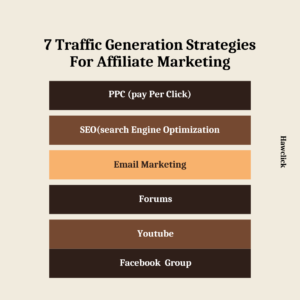Digital marketing in real estate is a strategy that uses the Internet to sell properties. This marketing strategy seeks to take advantage of the many opportunities on the internet to promote real estate business. Instead of using traditional marketing methods that limit you to people you can see, you can extend your reach to internet users. This innovative real estate marketing strategy arose from two factors.
In today’s digital age, the real estate industry is undergoing a significant transformation, and digital marketing is at the forefront of this evolution. Gone are the days when real estate agents relied solely on traditional advertising methods like flyers and newspaper ads to attract potential buyers or renters. In a recent survey, it was shown that more than 90% of home buyers utilize online media to find properties that meet their needs. Digital marketing is important for real estate businesses because it allows them to reach out to potential customers who may not have seen their listings yet. By using SEO, social media, email marketing, and YouTube, you can increase the number of leads you get, which will help grow your business.
A good digital marketing plan ensures that realtors can generate leads, create a reputable database of customers who know and trust them, and ultimately increase sales through targeted efforts and follow-up strategies. The digital platform is a comprehensive internet marketing and promotion package. With each new step, a real estate company gains a digital presence and becomes visible to people all over the world. In this blog, we’ll explore why digital marketing is crucial for real estate professionals and we’ll delve into some effective strategies for generating real estate leads through digital marketing.

How to strategize Digital marketing in real estate
Digital marketing in real estate can be highly effective if done strategically. The goal is to showcase properties, generate leads, and build trust with potential buyers, sellers, or renters. Here’s a comprehensive guide tailored to real estate:
1. Build a Strong Online Presence
Website Optimization
- Create a professional, mobile-friendly, and easy-to-navigate website. Creating a website for your real estate business will show prospective clients what you have to offer. Include listings on your site and update them regularly. This keeps prospects coming to your site as they search for properties.
- Include high-quality property listings with detailed descriptions, prices, and images.
- Add virtual tours or 3D walkthroughs for immersive property viewing.
- Integrate lead capture forms for inquiries.
Search Engine Optimization (SEO)
A well-optimized website is essential for attracting organic traffic and generating leads. You can also start a blog and create content optimized for SEO. This ensures your posts show up in prospect search results every time. Tools like Google Analytics and Ahrefs can help you find the search terms and keywords your target clients are looking for and will inspire you with fresh topic ideas.
- Keyword Research: Identify relevant keywords related to your local real estate market and incorporate them into your website’s content, including property descriptions, blog posts, and meta tags.
- Mobile Optimization: Ensure that your website is mobile-responsive. Many users search for properties on their smartphones, so a mobile-friendly site is crucial for a positive user experience.
- Local SEO: Claim and optimize your Google My Business listing. This helps your business appear in local search results, making it easier for potential clients to find you.
2. Leverage Social Media Platforms
Platform-Specific Strategies
- Instagram: Use high-quality images, reels, and carousel posts. Add engaging captions and use hashtags like #RealEstate or #DreamHome.
- Facebook: Post listings, client success stories, and market insights. Use Facebook Marketplace for local reach.
- LinkedIn: Share professional insights, network with potential investors, and build authority in the real estate niche.
- YouTube: Create property walkthrough videos, market updates, and tips for buyers or sellers.
Paid Advertising
- Run Facebook and Instagram ads targeting specific demographics (e.g., age, income, location).
- Use retargeting ads to re-engage visitors who viewed your properties.
3. Content Marketing
- Video Content: Post short videos about properties, neighborhood highlights, or the buying process.
- Infographics: Share visually appealing stats about the housing market.
- Blog Posts: Topics like “Top 5 Neighborhoods to Invest in 2024” or “What to Look for When Buying a Home.”
4. Utilize Email Marketing
Creating email marketing campaigns lets you connect with past and potential clients in real estate marketing. By keeping in touch, agents can stay top of mind with their audience, increasing the chances of receiving referrals or securing repeat business.
- Send newsletters with new listings, price reductions, and market updates.
- Use personalized email campaigns based on buyer preferences (e.g., “Homes with a pool in your area”).
- Create drip campaigns to nurture leads over time.
5. Invest in Pay-Per-Click (PPC) Advertising
- Use Google Ads to appear for high-intent search terms like “homes for sale near me.”
- Optimize landing pages for ad campaigns with strong CTAs like “Schedule a Viewing Today!”
6. Embrace Technology
Virtual Tours and 3D Walkthroughs
Watching virtual tours and videos of properties became a new pastime, and what began as a way to dream spurred many people to make it a reality. Real estate digital marketing utilizes the latest technology, such as drone photography and virtual staging, to give a vision of their future by showing them every nook and cranny of a property in ways an in-person showing can’t.
Your real estate digital marketing budget doesn’t have to bust when you create these videos–depending on the video quality you need, one of your brokers can do the filming themselves. Established businesses often hire professionals to create content for website tours and social media platforms to match their brand identity.
- Use tools like Matterport to offer immersive property experiences online.
- Allow clients to explore properties from the comfort of their homes.
AI and Chatbots
While the Internet might be on 24/7, we have rich lives to live. That means you can’t always be available when a potential client has an inquiry about a listing. Chatbots and AI assistants are the cutting-edge technology that savvy real estate companies are using on their websites to foster a sense of immediate attention, showing your customer that you care about their needs.
Chatbots can answer common questions like:
- showing times for a property
- scheduling a viewing right when the customer shows interest,
- striking while the proverbial iron is hot.
Chatbots are always active when your customer is on your website, collecting information and being that bridge to your firm in a friendly and non-invasive way.
The unexpected bonus of chatbots and AI assistants is their ability to free up your team, allowing them to provide a higher level of care and personal attention to your existing clients. That leads to improved morale within your organization, and the happier your colleagues are, the more money you’ll make.
- Integrate chatbots on your website to handle common queries and schedule viewings 24/7.

7. Focus on Reviews and Testimonials
- Encourage happy clients to leave reviews on Google, Yelp, and social media.
- Share testimonials and case studies to build credibility and trust.
8. Target Niche Audiences
- First-time homebuyers: Create educational content on navigating the buying process.
- Investors: Share data-driven insights on ROI and rental yields.
- Luxury buyers: Highlight premium features and exclusive neighborhoods.
9. Partner with Local Influencers
- Collaborate with local bloggers, Instagram influencers, or YouTubers who have a strong following in your area.
10. Track Performance
Using digital marketing lets you track your performance. With traditional marketing methods, such as flyers, it can be challenging to track the number of persons who viewed an advert. With digital marketing, you can track the number of views and clicks and know where they’re coming from to assess your success rate. This also serves as a guide in choosing the best marketing campaigns and strategies to implement.
- Use tools like Google Analytics and Facebook Insights to measure traffic, leads, and ad performance.
- Adjust strategies based on what’s working and eliminate underperforming tactics.
Pro Tip: Build Trust with Transparency
The real estate market thrives on trust. Showcase your expertise by sharing market insights, hosting webinars, or offering free consultations.
If you’d like help crafting a specific campaign or strategy, feel free to share more details about your goals!




